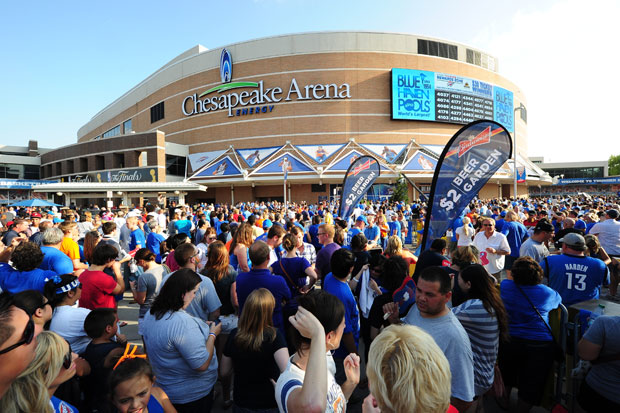
Fans arrive for Game 2 of the NBA Finals at the Chesapeake Energy Arena in Oklahoma City.
ROBYN BECK / AFP/GettyImages


Fans arrive for Game 2 of the NBA Finals at the Chesapeake Energy Arena in Oklahoma City.
ROBYN BECK / AFP/GettyImages

ROBYN BECK / AFP/GettyImages
Fans arrive for Game 2 of the NBA Finals at the Chesapeake Energy Arena in Oklahoma City.
The $89 million Chesapeake Arena was built with public money from a dedicated sales tax.
So did Oklahoma City get its tax money’s worth?
Yes, economists tell The Oklahoman‘s Don Mecoy — even if the impact is incalculable.
“We don’t have mountains. We don’t have a coastline. We don’t have a ski resort,” economist Mark Snead tells the paper. “Amenities include pro sports franchises. It’s one of those components that now make Oklahoma City completely in a different category.”
How do you put a price tag on a front-page Wall Street Journal story, or images of Oklahoma City’s skyline and throngs of local fans being beamed all over the world?
There are ways to estimate the real-world economic impact of sports teams, but it’s an imprecise science. OKC officials base their Thunder impact estimates on data collected during the New Orleans Hornets’ temporary stay in Oklahoma. Using that methodology, OKC is looking at more than $53 million in economic impact, Mecoy writes.
But before moving to OKC, the Seattle SuperSonics claimed a $234 million economic impact — “a huge difference from the Thunder estimates,” Mecoy notes.
Such studies often exaggerate the benefits, Robert Dauffenbach, director of the Center for Economic and Management Research at OU’s Price Business College tells The Oklahoman. Major sporting events often replace other entertainment spending and disrupt normal economic activity, which makes calculations even more difficult.
“The chief benefit is it puts you up there with the world-class kinds of cities. Frankly, we belong there with San Antonio and Seattle,” he tells the paper.
Dauffenbach’s sentiments echo those of Mickey Hepner, an economist and Dean of the University of Central Oklahoma’s College of Business Administration. In January — long before the OKC Thunder won the Western Conference title and made its way to the NBA finals — Hepner told a StateImpact audience that improving a state’s image is usually worth raising taxes for.
“It’s not usually about cutting taxes, it’s about enhancing the quality of life,” he said. “That should be the metric.”